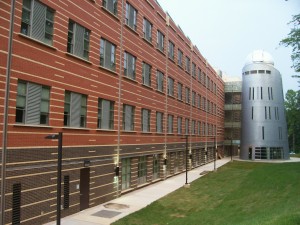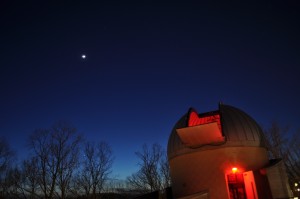The Lyrid meteor shower will reach its maximum rate of activity. Some meteors will be visible each night from 19 Apr to 25 Apr, but the best show will be on this evening. The maximum number of meteors expected to be visible from a dark location is around 10 per hour (ZHR). The Moon will be 13 days old at the time of peak activity, and being so close to Full Moon, will severely limit the observations that will be possible. Shucks!

This event was postponed from the previous week. 1st talk at 7PM, same talk at 7:45PM, observing starts at 7:30PM until 9PM.
Campus Map – The George Mason University Observatory at the Fairfax Campus building Research Hall formerly known as Research I.
Tuesday 23 April 2013: This date IF AND ONLY IF 23 April 2013 canceled due to weather. 1st talk at 7 PM, same talk at 7:45PM, observing starts at 7:30PM until 9PM.
April’s Full Moon is the “Egg Moon”, “Pink Moon”, “Sprouting Grass Moon”, “Fish Moon”, “Seed Moon”, “Waking Moon”, or “Hanuman Jayanti”.

Cancelled due to rain!
1st talk at 7PM, same talk at 7:45PM, observing starts at 7:30PM until 9PM.
Campus Map – The George Mason University Observatory at the Fairfax Campus building Research Hall formerly known as Research I.
Tuesday 7 May 2013: This date IF AND ONLY IF 30 April 2013 canceled due to weather. 1st talk at 7PM, same talk at 7:45PM, observing starts at 7:30PM until 9PM.
This shower should peak on May 5 or 6. It’s not the biggest craziest annual shower (you can expect to see a trail on average every 6-10 minutes) however in 2013 this is one of the few showers this year that will occur in the relative darkness of a quarter moon.
This meeting is a week earlier due to Mother’s Day. Our guest speaker is Dr. Madhulika “Lika” Guhathakurta. She’s a solar physicist, program scientist for the STEREO mission, and lead scientist of NASA’s “Living with a Star” program. She’ll be speaking about space weather and solar storms.
More information on our general meetings can be found at: http://www.novac.com/meetings/

1st talk at 7:30PM, same talk at 8:15PM, observing starts at 8PM until 9:30PM.
Campus Map – The George Mason University Observatory at the Fairfax Campus building Research Hall formerly known as Research I.
Buzz Aldrin will discuss his new book “Mission to Mars: My Vision for Space Exploration.” A book signing will follow the discussion. Tickets are free for NPC members and $5.00 for the general public. After the discussion, Dr. Aldrin will only sign copies of “Mission to Mars.” All books must be purchased through the National Press Club. No memorabilia or outside books will be permitted. Legendary “space statesman” Buzz Aldrin speaks out as a vital advocate for the continuing quest to push the boundaries of the universe as we know it. As a pioneering astronaut who first set foot on the moon during mankind’s first landing of Apollo 11 – and as an aerospace engineer who designed an orbital rendezvous technique critical to future planetary landings – Aldrin has a vision, and in “Mission to Mars” he plots out the path he proposes, taking humans to Mars by 2035. Aldrin boldly advocates continuing exploration of our solar system at a time when America stands at a critical crossroads in its space program. He outlines past triumphs, analyzes recent setbacks, and cheers us on to greater accomplishments, with a message that will ignite a new wave of support and participation across the country for a renewed and ambitious space program. Buzz Aldrin, best known for his Apollo 11 moonwalk, holds a doctorate degree in astronautics and, at the age of 82, continues to wield influence as an international advocate of space science and planetary exploration. This event is a fundraiser for the National Press Club Journalism Institute.

